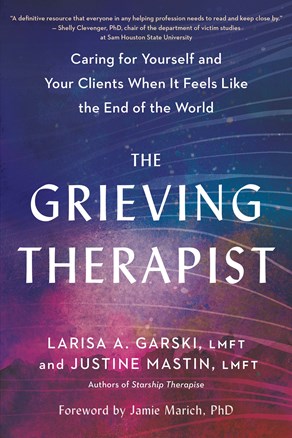Description
For readers of No Cure for Being Human and Simple Self-Care for Therapists, a witty and compassionate field guide to the 10 realms of grief--and how to navigate them yourself and with clients.
How do you practice good therapy when it’s the end of the world as we know it…and no one feels fine?
The planet is burning, friends and family are falling to cults and QAnon, and we’re all living through the collective trauma of a global pandemic. Among therapists and healers, burnout is rampant; hopelessness and despair are, too. In The Grieving Therapist, psychotherapists Larisa Garski, LMFT, and Justine Mastin, LMFT, give voice to the difficulties of therapising in today’s world--and offer a grief-informed framework for taking care of yourself as you take care of others.
Informed by narrative, internal family systems, fanfic, and trauma-sensitive therapy, Garski and Mastin examine what it means to be a therapist at the end of the world (or what feels like it). They break down 10 realms of grief that are critical to understand and work with today, but likely weren’t taught to you in therapy school. Each chapter includes:
- Grieving tools that can be adapted for both client and therapist
- Tips for supervisors and supervisees
- Skills for maintaining healthy outside-the-office relationships
- Support for current therapy students (and therapists new to the field)
- Advice on how to hold space and work with clients who have the same questions—and are navigating the same issues—as you
- Meditations on love, life, death, and connection
Garski and Mastin also share helpful guidance around working with clients whose social or political beliefs differ from yours; when therapeutic self-disclosure makes sense; honoring the information that countertransference is trying to give you; and how to sit with (or step away from) triggers in your work.
With humor, compassion, irreverence, and more than a little whimsy,
The Grieving Therapist shows you how to show up for yourself, and your clients--in your own full humanity, amidst it all.
About the Author
JAMIE MARICH, PhD, travels internationally speaking on EMDR therapy, trauma, addiction, expressive arts, and mindfulness while maintaining a private practice in Warren, Ohio. Marich is the author of several books, including Dissociation Made Simple and Transforming Trauma with Jiu-Jitsu. STEVE DANSIGER, PsyD, is a consultant, clinician, and meditation teacher. Developer of the MET(T)A Protocol--a design for mental health agency treatment using Buddhist Mindfulness and EMDR Therapy, which is used in trauma and addiction treatment centers nationwide--Dansiger is the author of several books.
